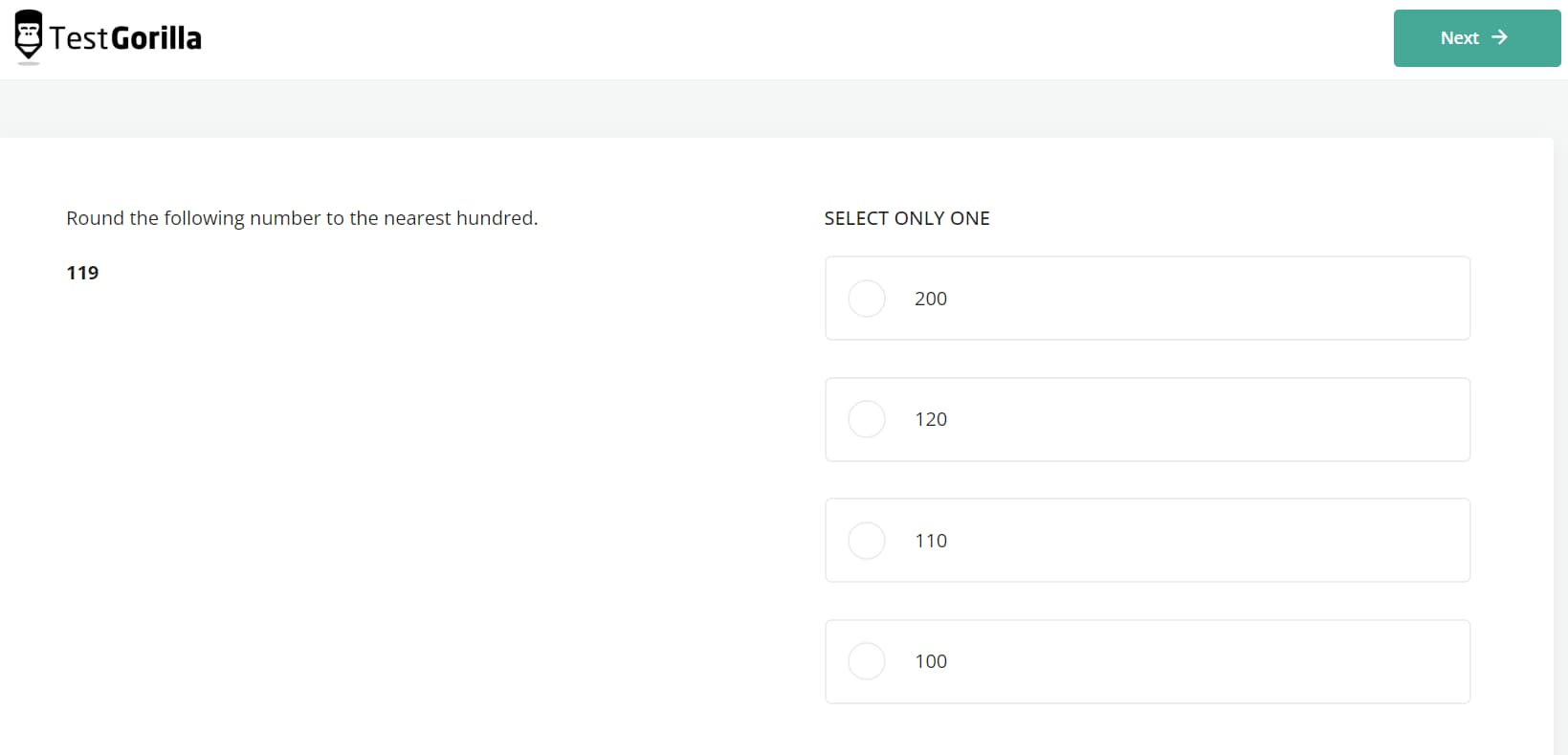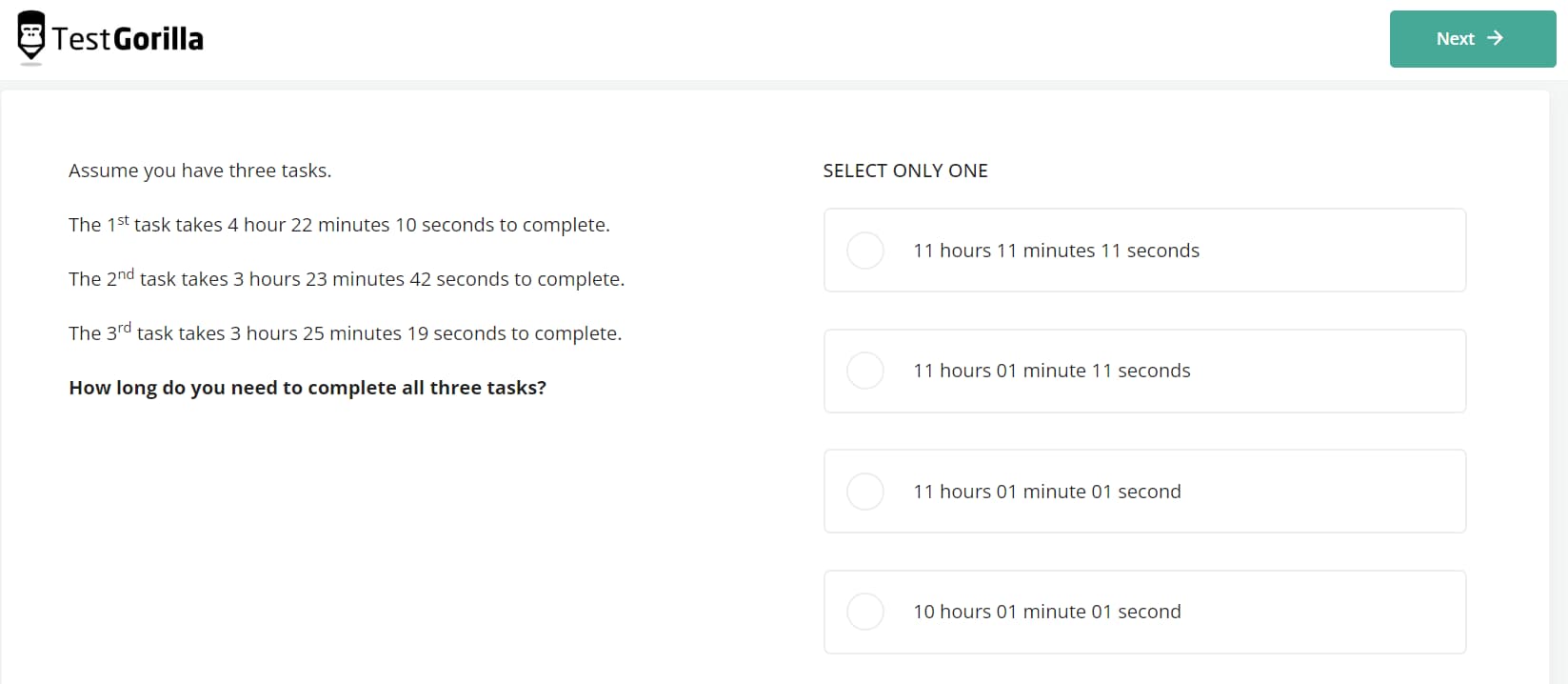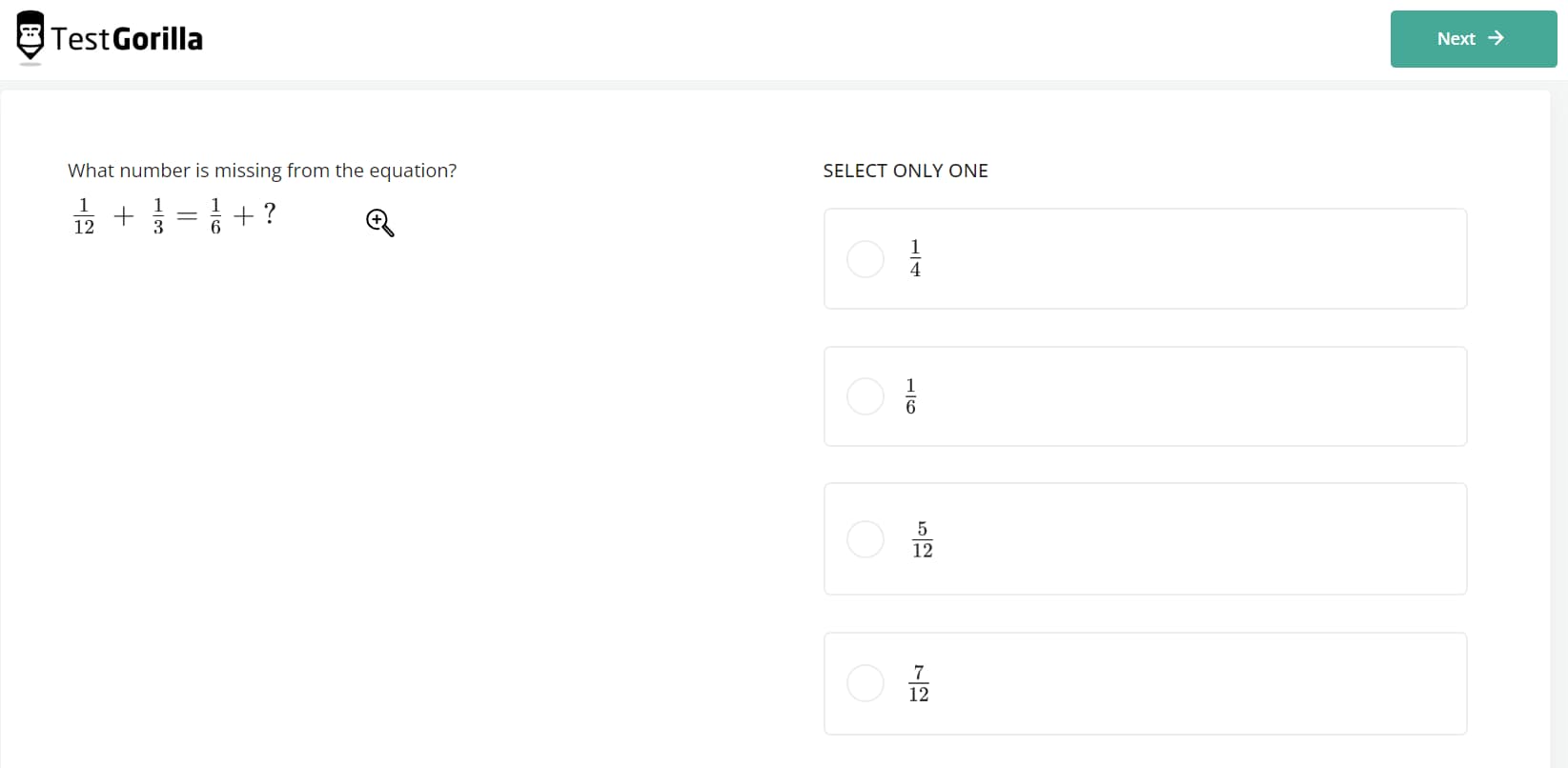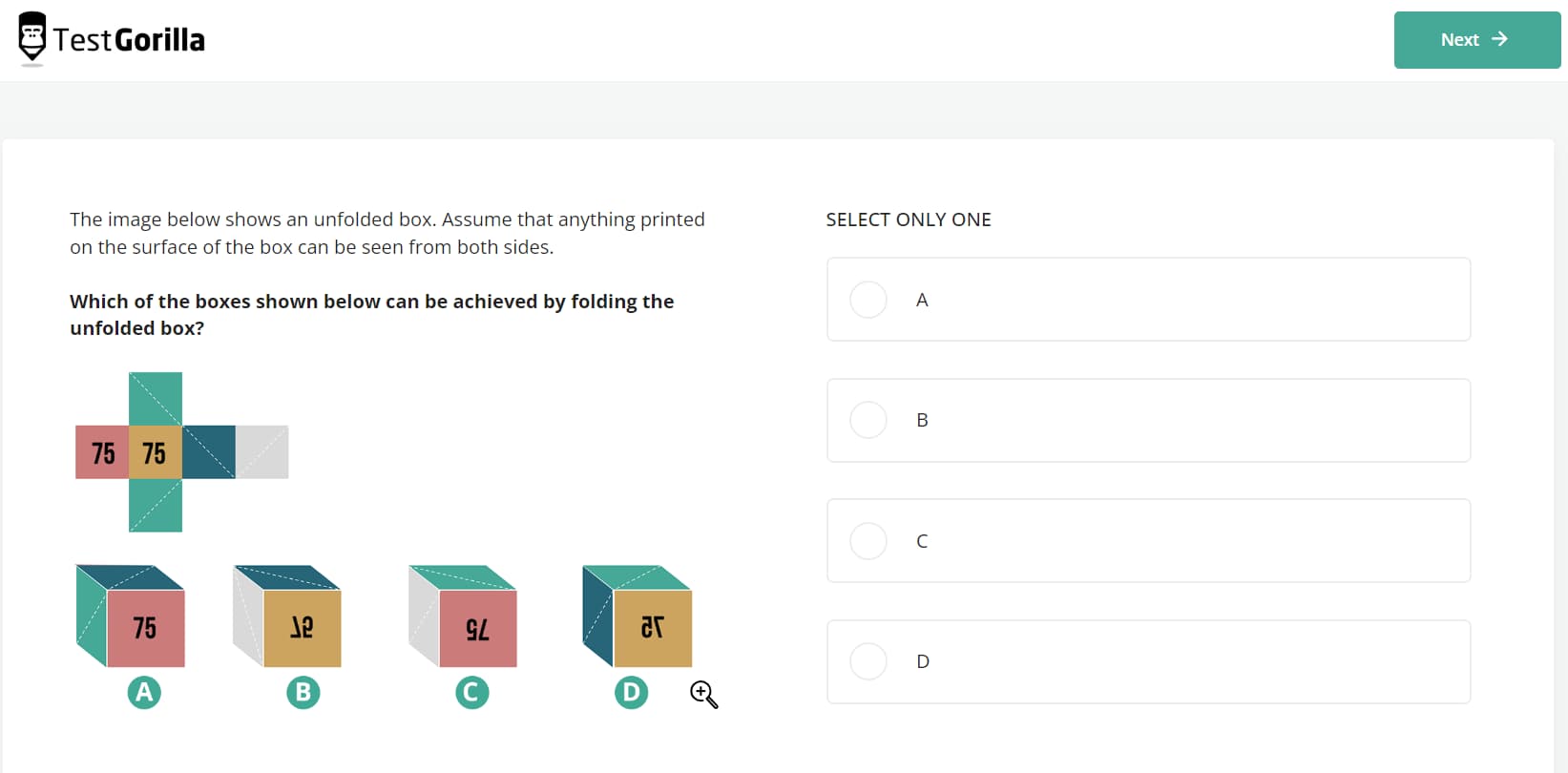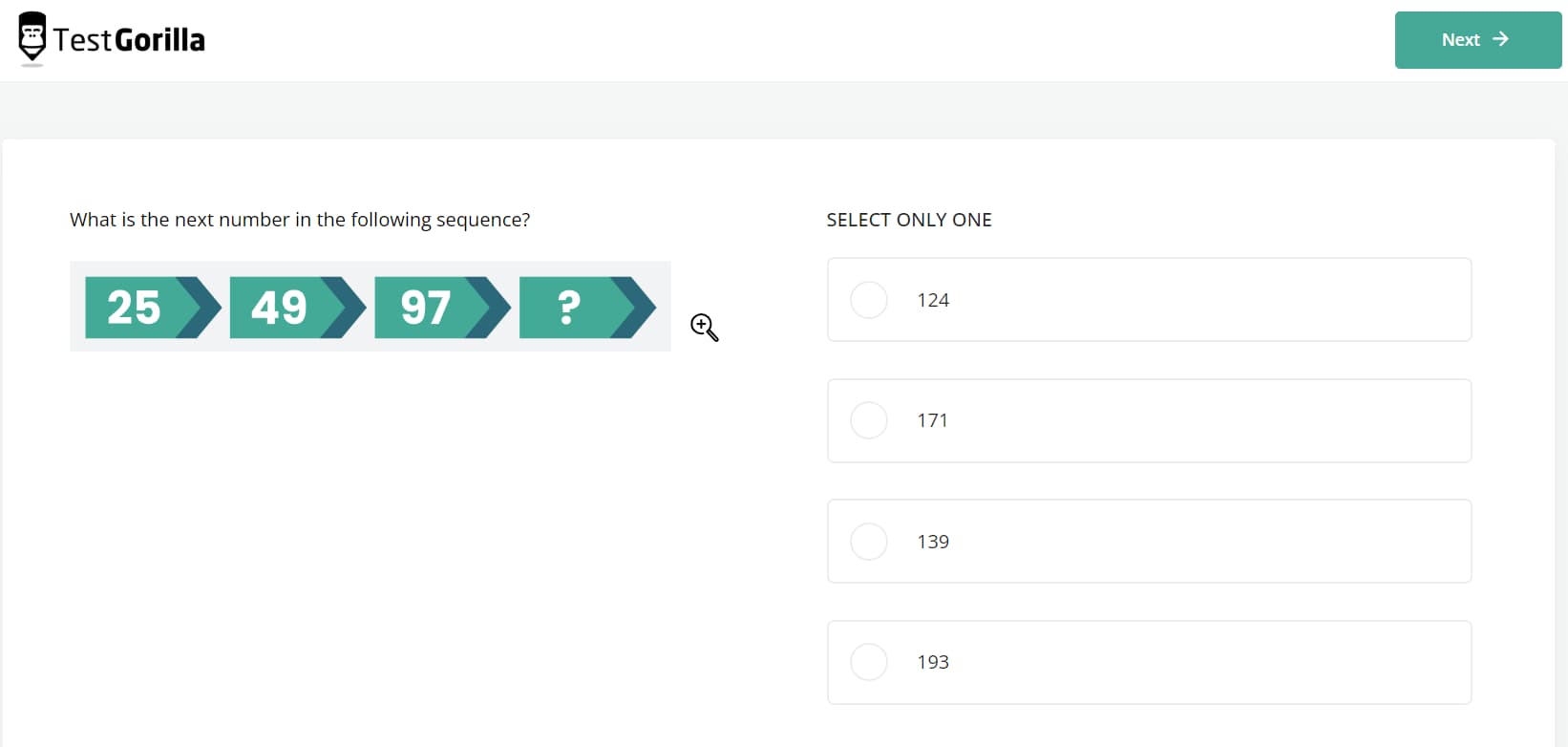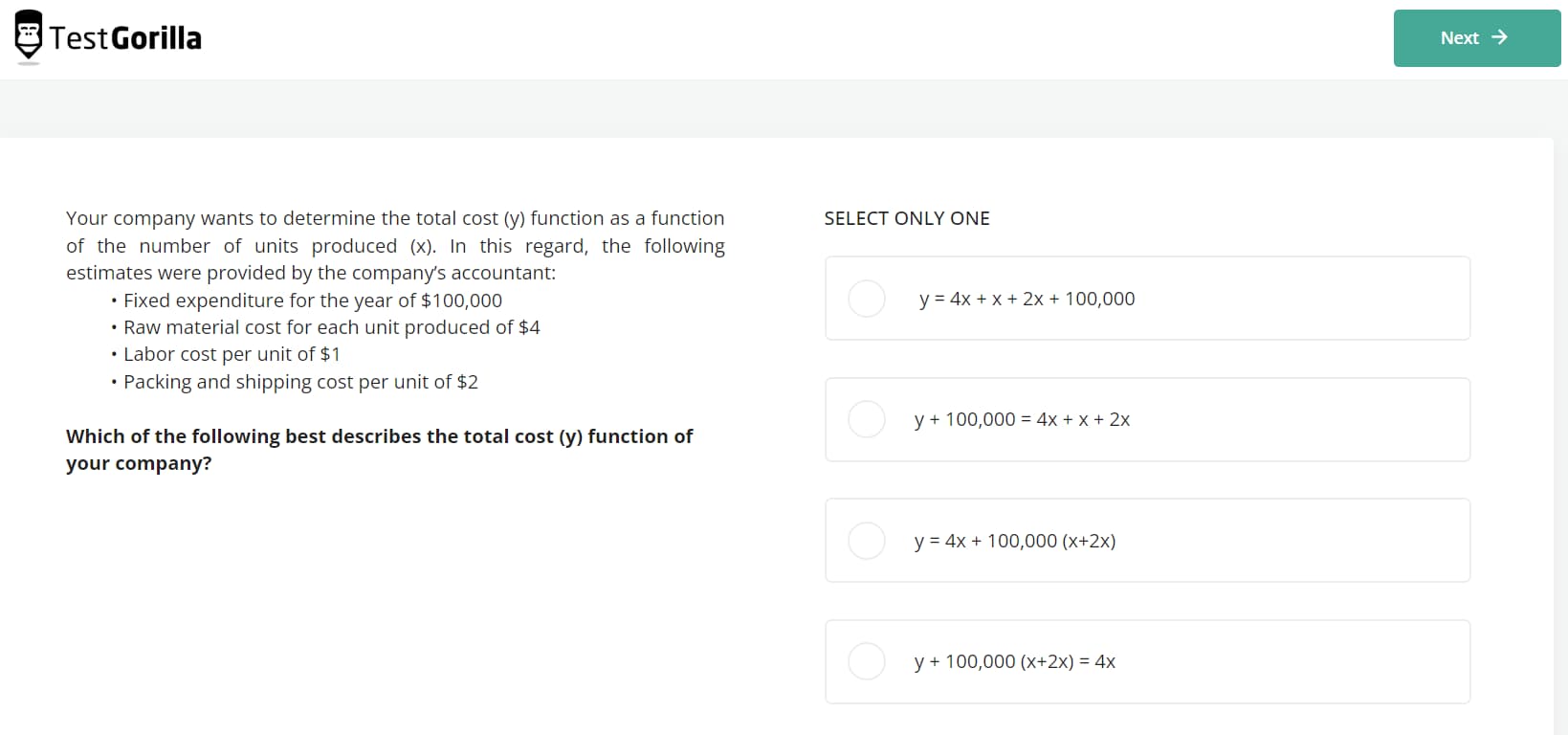Pre employment math tests: How to evaluate your candidates’ skills using math assessments
Are you unsure of how to find employees with strong mathematical abilities? Are you planning to rely on resumes to gauge skills and make recruitment decisions?
There’s a better option – pre-employment math tests. They’re the fastest, most accurate method to assess your candidates and optimize your hiring process.
In this article, we review everything you need to know about pre-employment assessments, including the most important math skills assessments and how to use them to recruit the best applicants.
Table of contents
- What is a pre-employment math test?
- Why are math skills important in the workplace?
- Which roles require a math aptitude test for employment?
- How to evaluate candidates’ math skills during recruitment: 5 strategies
- 7 types of pre-employment math tests you can use to hire better employees
- Hire the best candidates with TestGorilla’s math skills tests
- Pre-employment math test FAQs
What is a pre-employment math test?
A pre-employment math test, also called a math aptitude test, is an evaluation used to screen job applicants for the math skills needed for a particular role. Pre-employment math tests are usually 10 to 30 minutes long and have multiple-choice questions. Although the questions are typically not too challenging, the time limit pushes candidates to think quickly, simulating the real-world demands of a job.
Pre-employment math aptitude tests are one of several cognitive ability tests performed in the screening stage to streamline the recruitment process.
These tests are part of a comprehensive pre-employment skills assessment, which evaluates candidates for hard and soft skills necessary for a position.
Why are math skills important in the workplace?
Employees with strong math skills are better prepared to make good business decisions to support your company’s growth. They can understand and analyze numerical data, make logical conclusions, assess results, compare outcomes, and evaluate risk.
Math skills are also related to and support many other crucial skills, such as:
Reasoning and logic
Precision and attention to detail
Analytical skills and the candidate’s ability to work with data
The best insights on HR and recruitment, delivered to your inbox.
Biweekly updates. No spam. Unsubscribe any time.
Which roles require a math aptitude test for employment?
According to research, 94% of all jobs require some math skills. You should consider including math skills tests in any pre-employment screening process.
A pre employment math assessment test can help you:
Identify hidden potential
Save time and money
Avoid hiring bias
Depending on the role you’re hiring for, you can use basic, intermediate, or advanced tests. In most cases, basic and intermediate tests are more than sufficient to find productive employees; however, strong math skills are necessary for fields such as:
Engineering
Programming
Manufacturing
Science and research (especially STEM fields)
Finance and economics
Service and hospitality
Statistics
Sociology
Management
Analysis
Consultancy
Construction and design
How to evaluate candidates’ math skills during recruitment: 5 strategies
Employers use pre employment math assessments to get an accurate evaluation of candidates’ math skills.
Let’s take a look at five different strategies you can use to evaluate candidates:
1. Create and administer custom math tests
Creating a custom math skills assessment test for employment is the most resource-intensive way to evaluate your candidates. You need to:
Prepare the tests
Ensure all questions are correctly formulated
Administer them to applicants (either in person or online)
Minimize the possibility of cheating
Grade the tests manually and analyze the results
Preparing custom math tests is necessary for specific roles or fields (like those involving research), but there are usually faster and more efficient ways to test candidates’ math skills.
Large organizations, like McKinsey and IBM, have the resources to control custom skills evaluations. However, this isn’t the best option for most smaller companies, given how time-consuming it is to create a custom math exam for employment.
2. Look at education and experience
Although previous work experience, education, or academic achievements can indicate the strong math skills of your candidates, they are not the best ways to evaluate these skills.
Even if the candidate has this degree and spent the past five years working with data, how can you know the exact level of their knowledge or expertise?
The answer is: You can’t. Relying only on previous experience and education can lead to unconscious hiring biases.
In addition, you could hire someone who claims they have intermediate or advanced skills when they don’t. Without testing, you can’t find out before they start working for you.
This math skills gap can lead to significant challenges when they are required to apply these skills in practical scenarios, which affects productivity and project success. This is why you should use basic math tests for employment rather than assessing education or experience.
3. Use automated skills tests
Unlike custom tests that require significant time and resources to develop, automated skills tests provide a ready-to-use, standardized assessment tool to evaluate a person’s math abilities quickly.
This method saves time and ensures consistency and objectivity in evaluation, minimizing the risk of similarity bias that affects 78% of hiring decisions.
As a result of using a basic math test for job preparedness, you are more likely to hire people who possess strong analytical skills, attention to detail, and problem-solving skills, helping them thrive in a math-heavy role.
For example, Orbit Technologies used our skills tests to hire highly skilled engineers. The combination of testing for technical skills like math, cognitive ability, and personality helped hire top candidates and reduce instant attrition rates by 50%.
4. Ask math interview questions
A good way to gain a deeper understanding of applicants’ knowledge is to use math skills interview questions. This approach is best when you use skills tests.
You can tailor your math interview questions to the role you are hiring for and use structured interviewing to reduce bias and make candidate evaluation more objective.
Here are a few examples of questions you can use:
How do you convert fractions to percentages?
Can you describe a time when you used mathematical principles to solve a complex problem at work?
Can you explain how you can validate the accuracy of financial reports before presenting them to stakeholders?
5. Try a skills assessment platform
Whether you need a basic math test for job preparedness or something more advanced, skills-testing platforms like TestGorilla can help with ready-made tests.
You can use these talent assessments to measure skills like basic double-digit or triple-digit math for roles that require an understanding of elementary-level math.
More complex assessments, like TestGorilla’s Intermediate Math test, evaluate applicants’ capacity to solve intermediate math problems involving percentages, fractions, decimals, ratios, and time calculations.
Candidates who perform well on these tests can manipulate numbers and analyze numerical data to draw conclusions and solve problems. These skills can be valuable if a potential employee needs to create budgets, analyze metrics, assess risk, calculate salaries, interpret financial data, or perform other tasks that involve math calculations.
Advantages of using a math assessment platform
Objective: Candidates receive the same questions and are graded objectively based on their performance
Accurate: Tests are created by subject-matter experts and rigorously assessed by other specialists
Easy to administer: Regardless of how many candidates you want to screen, you can distribute skills tests with a single click
Automatically rated: The platform calculates test scores automatically, which makes it easy to evaluate and compare candidates’ skills
7 types of pre-employment math tests you can use to hire better employees
Preparing and selecting the right math exam for employment is crucial for assessing the specific math abilities your open position requires.
Below, we explore seven assessments you can use to determine your candidates’ exact mathematical knowledge level:
1. Basic Math Calculations test
The Basic Math Calculations test evaluates a person’s understanding of fundamental mathematical operations. These math skills are important for everyday tasks, ensuring precision and efficiency in the workplace.
What skills does this test cover? | Who is this test best suited for? |
Elementary math skills are crucial for various operational tasks, including: Addition, Subtraction, Multiplication, Division | Positions where new hires frequently engage in tasks requiring basic math calculations: Hospitality, Data entry, Retail, Customer service, Entry-level office roles, Production lines, Warehouses |
This 10-minute test consists of 15 questions, such as:
For more sample questions, check out the Basic Math Calculations test preview.
2. Basic Double-Digit Math test
The Basic Double-Digit Math test evaluates a job candidate’s basic understanding of numbers and their ability to do simple calculations. These math skills help with small day-to-day tasks that don’t require complex reasoning or problem-solving.
What skills does this test cover? | Who is this test best suited for? |
The skills necessary to add measurements or perform time calculations that help candidates measure their time or tasks more efficiently, including: Basic algebra, Multiplication and division, Calculating time, Determining the nearest number | Any role that requires basic math skills at the elementary level – especially service or manufacturing positions: Manufacturing workers, Industrial workers, Cashiers, Hospitality workers |
This basic math assessment test for employment contains 15 multiple-choice questions your candidates need to answer in 10 minutes or less. Here’s an example:
3. Basic Triple-Digit Math test
The Basic Triple-Digit Math test is more difficult than the double-digit test. It measures the candidate on the same basic ability to solve math equations but using triple-digit numbers, fractions, or larger time quantities.
What skills does this test cover? | Who is this test best suited for? |
It assesses a person’s capacity to perform simple time calculations and understand the relationship between nearest numbers and fractions. The skills covered in the test include: Addition and subtraction, Multiplication and division, Calculating time, Determining the closest number, prime numbers, and fractions | Roles that require basic math skills but at a more intermediate level – especially service or labor roles: Manufacturing workers, Industrial workers, Cashiers, Bank tellers, Hospitality workers |
This test contains 15 multiple-choice questions that measure intermediate math skills. Here’s an example of a question you can find in this assessment:
4. Intermediate Math test
The Intermediate Math test assesses a person’s ability to solve math problems that involve fractions, decimals, percentages, ratios, and time measurements. Candidates who perform well on this test understand how to manipulate numbers to reach a solution.
What skills does this test cover? | Who is this test best suited for? |
The math skills necessary for more complex problem-solving, such as calculating salaries, projecting growth, and evaluating ROI, including: Fractions, Decimals, Ratios and percentages, Time estimates | Any job role that requires higher-level math skills to reach a solution. These include roles in which decisions need to be made based on figures or development-oriented roles in which measurements are necessary: STEM roles, Designers, Architects, Financial workers, Knowledge employees working with data |
This 10-minute test contains 15 multiple-choice questions like this one:
5. Spatial Reasoning test
The Spatial Reasoning test evaluates a candidate’s understanding, reasoning, and memory for the spatial relationships between objects and space. For example, it measures the ability to manipulate a two- or three-dimensional object in their mind.
What skills does this test cover? | Who is this test best suited for? |
Four distinct spatial reasoning abilities, including: Mental rotation, Spatial working memory, Mental folding, Spatial visualization | Any role that requires analyzing or manipulating objects: Mechanical engineers, Chemical engineers, Researchers, Designers, Architects |
Here’s a type of question you can expect:
Hire a candidate with the right math skills
Are you ready to hire a candidate with the right math skills using our talent assessments?
6. Numerical Reasoning test
The Numerical Reasoning test evaluates the applicant’s overall numeracy skills. It helps you assess their ability to interpret and use numbers for a wide range of applications in a professional context.
What skills does this test cover? | Who is this test best suited for? |
Essential numeracy skills that staff need for day-to-day tasks, including: Interpretation of charts and tables, Arithmetic operations, Manipulation of data, Interpretation of numerical patterns | A wide variety of roles where candidates need strong numeracy skills to succeed: Accountants, Consultants, Insurance agents, Engineers, Architects, Account managers, Sales representatives |
You can use the Numerical Reasoning test for any role that requires working with numbers daily.
This 10-minute pre employment math assessment test contains 12 questions, such as this one:
For more sample test questions, check out the Numerical Reasoning test preview.
7. Financial Math test
The Financial Math test evaluates applicants’ abilities to solve financial problems using mathematical concepts. It uses scenario-based questions to assess how candidates handle issues related to finances.
What skills does this test cover? | Who is this test best suited for? |
Vital financial math skills that help you overcome common problems in the financial department, including: Financial equations, Linear programming for optimization, Mathematical progressions in economic contexts, Time value of money applications | Any financial roles responsible for doing mathematical analysis and computations to drive business decisions: Financial analysts and researchers, Finance executives, Finance and accounts department members |
The test is intermediate level, takes about 10 minutes, and includes questions like this one:
If you’re interested in how you can incorporate TestGorilla’s math assessments into your hiring process, book a live demo with one of our friendly colleagues to learn more.
Hire the best candidates with TestGorilla’s math skills tests
Using TestGorilla’s pre-employment math tests can help assess the mathematical skills of your candidates, helping you make the best hiring decision.
You can use one or more of the following tests depending on the role:
Basic Math Calculations test
Basic Double-Digit Math test
Basic Triple-Digit Math test
Intermediate Math test
Spatial Reasoning test
Numerical Reasoning test
Financial Math test
If you’re eager to dive in, our product tour offers a detailed walkthrough of our tests.
Then, once you’re ready to start, sign up for our free forever plan and start using our talent assessments immediately.
Pre-employment math test FAQs
Have more questions about pre-employment math assessments? You can find your answers below.
What is a pre-interview math assessment?
A pre-interview math assessment is a standardized test to evaluate an applicant’s mathematical abilities and problem-solving skills before an interview. This test is crucial for roles where mathematical capabilities are key, helping employers identify candidates with the right knowledge. This early assessment streamlines the hiring process by ensuring only skilled applicants proceed to the next stage.
What types of questions are on a basic math aptitude test?
A basic math assessment test for employment evaluates the essential math skills required for everyday workplace tasks. They include questions about fundamental mathematical operations, such as addition, subtraction, multiplication, and division. These assessments can also cover basic geometry, fractions, decimals, percentages, and simple problem-solving scenarios to assess practical math application and numerical reasoning.
What makes a good math assessment?
A good math assessment effectively measures various mathematical skills relevant to the job role, from basic arithmetic to complex problem-solving. The questions should be clear and tailored to the math level needed for the position. The test should be reliable and valid, providing consistent results reflecting the individual’s math proficiency.
What are the advantages of using a math aptitude test?
A math pre-employment test objectively measures a candidate's mathematical skills, ensuring consistency and fairness in evaluation. They help reduce hiring biases by focusing on skills and selecting candidates best suited for the role to streamline the hiring process, saving you time and resources.
How can candidates prepare for pre-employment math tests?
Candidates can prepare for pre-employment math tests by reviewing fundamental math concepts, working on problem-solving skills, and taking practice tests. They can focus on basic math operations, fractions, and percentages. You can use sample questions from actual tests and math practice apps to get familiar with the format, improve speed, and boost accuracy.
You've scrolled this far
Why not try TestGorilla for free, and see what happens when you put skills first.



